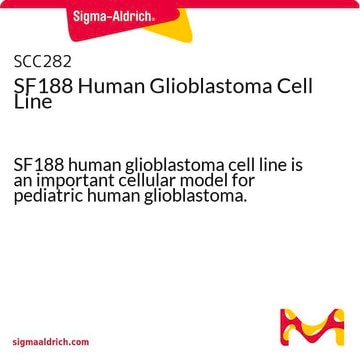SCC163
HOG Human Oligodendroglioma Cell Line
Human
Synonym(s):
Oligodendroglioma cells
About This Item
Recommended Products
product name
HOG Human Oligodendroglioma Cell Line, HOG human oligodendroglioma cell line is a useful model to study the role of oligodendrocytes in neurodegenerative diseases.
biological source
human
technique(s)
cell based assay: suitable
cell culture | mammalian: suitable
General description
Cell Line Description
Application
Neuroscience
Quality
• Cells are tested by PCR and are negative for HPV-16, HPV-18, Hepatitis A, C, and HIV-1 & 2 viruses as assessed by a Human Essential CLEAR panel by Charles River Animal Diagnostic Services.
• Cells are negative for mycoplasma contamination.
• Each lot of cells is genotyped by STR analysis to verify the unique identity of the cell line.
Storage and Stability
Disclaimer
Storage Class
10 - Combustible liquids
wgk_germany
WGK 1
flash_point_f
Not applicable
flash_point_c
Not applicable
Certificates of Analysis (COA)
Search for Certificates of Analysis (COA) by entering the products Lot/Batch Number. Lot and Batch Numbers can be found on a product’s label following the words ‘Lot’ or ‘Batch’.
Already Own This Product?
Find documentation for the products that you have recently purchased in the Document Library.
Our team of scientists has experience in all areas of research including Life Science, Material Science, Chemical Synthesis, Chromatography, Analytical and many others.
Contact Technical Service






